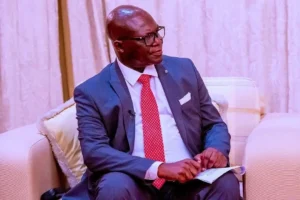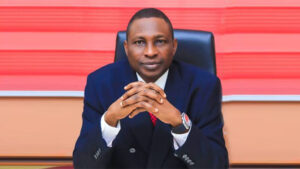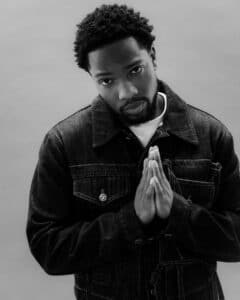
Alain Bernardo Bongo (Born on February 9, 1959) is a prominent political figure from Gabon, widely known as Ali Bongo. He has left an indelible mark on the country’s political scene and has been instrumental in shaping its political trajectory. Ali Bongo assumed the presidency, becoming the third president of Gabon, and held this significant position from 2009 to 2023 before he was overthrown by the Gabon military. His leadership spanned a crucial period in Gabon’s political evolution.
Early Life
Ali Bongo’s upbringing traces back to Brazzaville, the capital and largest city of the Republic of the Congo. Born and raised in this vibrant city, he was nurtured by his parents: his father, Omar Bongo Ondimba, who had served as the previous president of Gabon, and his mother, Patience Dabany, a notable figure as the former first lady of Gabon.
Notably, Ali Bongo’s mother was just 18 years old at the time of his birth, marking the beginning of a life that would intertwine with politics and leadership.
Growing up, Ali Bongo shared his childhood with his siblings: Pascaline Bongo Ondimba, Albertine Amissa Bongo, and Frédéric Bongo Ondimba. Their familial bonds and shared experiences formed a backdrop to the unfolding of his future endeavors.
Ali Bongo played a pivotal role in the government’s operations during his father’s presidency. His political journey started in 1989 when he assumed the Minister of Foreign Affairs position, engaging in diplomatic affairs and representing Gabon on the global stage. This role showcased his early aptitude for international relations and governance.

From 1991 to 1999, Ali Bongo took on a new mantle as a Deputy in the Gabonese National Assembly, representing Bongoville. This period marked his active participation in legislative matters, contributing to shaping the nation’s laws and policies.
He demonstrated his commitment to national security and served as the Minister of Defense from 1999 to 2009. This significant role underscored his responsibility for overseeing the defense matters of the country during a pivotal period.
The passing of his father, Omar Bongo, marked a turning point in Ali Bongo’s journey. He transitioned from being a part of the political structure to forging his path. 2009 witnessed a significant milestone as he contested and emerged victorious in the Gabonese presidential election.
This triumph signaled a transformative phase in his career as he transitioned from his previous ministerial roles to taking on the highest office in the nation, embodying his commitment to leadership and public service.
Education
Ali Bongo’s educational journey led him across continents, encompassing both France and China, and his experiences spanned academics and the world of music. His initial steps were taken in Neuilly, France, where he attended a private school. This formative period in France laid the groundwork for the diverse pursuits that would follow in his life.
Continuing his educational aspirations, Ali Bongo pursued a degree in law at the prestigious Sorbonne University. This academic pursuit deepened his understanding of legal intricacies and cultivated his abilities in critical thinking and analysis, skills that would later prove invaluable in his political and leadership roles.
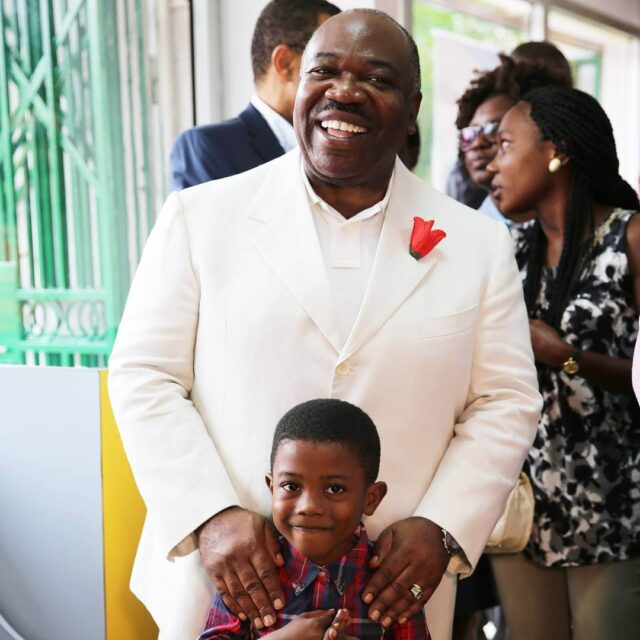
In a testament to his notable contributions and accomplishments, Ali Bongo was granted an honorary doctorate of law from China’s Wuhan University in 2018. This esteemed recognition from a prominent Chinese institution highlighted his international standing and dedication to nurturing global relationships and cooperation.
Beyond his academic and political endeavors, Ali Bongo’s talents reached into the realm of the arts. In a fascinating turn of events, he delved into the world of music in 1977. Under his creative banner, he released a funk album titled “A Brand New Man.”
This foray into music showcased his artistic flair and demonstrated his multifaceted nature beyond his roles in politics and academia. Notably, the album received professional production from Charles Bobbit, further enhancing the collaborative and creative dimensions of Ali Bongo’s musical exploration.
Career
Ali Bongo’s professional journey encompassed an intricate tapestry of roles within Gabon’s political arena. Beginning his association with the Gabonese Democratic Party (PDG) in 1981, he progressively advanced through the ranks, achieving his election to the PDG Central Committee in 1983. These early steps within the party paved the way for pivotal responsibilities.
A milestone in his political career was marked between 1987 and 1989 when Ali Bongo assumed the position of High Personal Representative of the President of the Republic. In this role, he played a pivotal part in representing the president’s interests. A significant advancement followed in 1989, as his father, President Omar Bongo, appointed him Minister of Foreign Affairs and Cooperation. This appointment marked a crucial turning point, showcasing his capabilities and expanding his influence on the international stage.

Ali Bongo’s trajectory evolved through the 1990s. In the 1990 parliamentary election, he secured a seat in the National Assembly as a PDG candidate in Haut-Ogooué Province, solidifying his presence in Gabonese politics. After a tenure as Foreign Minister, a constitutional amendment requiring ministers to be at least 35 years old prompted his transition from the government.
In 1991, Ali Bongo assumed the role of Deputy in the National Assembly, actively participating in legislative matters. Notably, he orchestrated a visit by the renowned pop singer Michael Jackson to Gabon in 1992, showcasing his proactive approach to promoting cultural exchanges.
His roles diversified, including leadership within the Higher Council of Islamic Affairs of Gabon (CSAIG) in 1996 and his continuous service as the Minister of National Defense from 1999 onward. His significance within the National Assembly and the PDG endured as he continued representing Haut-Ogooué Province and contributing to the party’s endeavors.
His impact transcended domestic matters. In 2005, Ali Bongo played a pivotal role in his father’s re-election campaign, serving as the Coordinator-General of Youth. His ascent continued as he attained the rank of Minister of State in 2006 while maintaining his role in national defense.
Tragically, Ali Bongo’s life ended on June 8, 2009, creating a seismic shift in the political landscape. Despite his untimely passing, he remained a candidate in the PDG’s preliminary presidential election. His legacy endured, with his dedication to defense and politics resonating within the government and the PDG.
In subsequent years, Ali Bongo’s influence remained palpable. In 2016, he announced crucial governmental appointments, showcasing his ongoing impact on political decisions. His commitment to Gabonese politics and the PDG solidified his place as a significant historical figure.
In January 2018, the Gabonese parliament introduced a two-round electoral ballot system to replace the previous first-past-the-post approach. However, this decision was reversed in April 2023, shortly before the general elections, following political consultations. The government implemented other changes, including instituting five-year terms for elected officials and eliminating re-election limits.
Leading up to the scheduled elections on August 26, 2023, the Gabonese Center for Elections introduced a late alteration, requiring voters to support a parliamentary candidate from the same party as their chosen presidential candidate. This change posed a challenge for opposition candidate Albert Ondo Ossa, who couldn’t be simultaneously endorsed alongside the parliamentary representative from the opposition coalition.
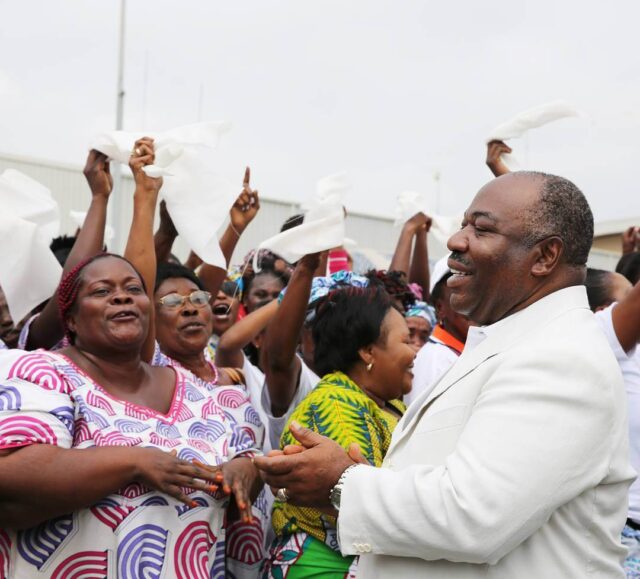
On election day, reports of foreign media and observers being denied entry surfaced. Delays and lengthy queues were reported at polling stations. Following voting, the government enforced a curfew, restricted media access, and limited internet usage.
Just before polls closed, Ondo Ossa alleged fraud orchestrated by the incumbent camp and claimed victory. Official election results were abruptly announced overnight on state television, leading to curfews and internet shutdowns to prevent misinformation and potential unrest.
On August 30, the Gabonese electoral commission declared Ali Bongo’s re-election with 64.27% of the vote. Shortly after, the military seized the Presidential Palace, citing Bongo’s governance as irresponsible. They announced the dissolution of state institutions, closed the borders, and arrested Bongo and his eldest son on charges including treason and embezzlement. Despite his detention, Bongo released a distressing video on social media, appealing for support.
The military’s coup d’état resulted in a junta taking control and installing Brice Oligui as interim president, marking a pivotal transformation in Gabon’s political landscape.
Personal Life
Ali Bongo’s personal life has been characterized by significant relationships and intricate family dynamics. In 1989, he entered a marriage with his first wife, Sylvia Valentin, who is of French nationality. Notably, Sylvia is the daughter of Édouard Valentin, a prominent figure who served as the CEO of the Omnium gabonais d’assurances et de réassurances (OGAR) insurance company.

In 1994, Ali Bongo’s marital journey took a different course as he entered into a marriage with his second wife, Inge Lynn Collins Bongo. Inge Lynn Collins Bongo hailed from Los Angeles, California, United States. Interestingly, when Ali Bongo assumed the presidency, Inge Bongo was residing in California on food stamps, indicating a notable shift in lifestyle and circumstances. This change underscores the complexities of their journey and the transformations they experienced.
However, their marital union faced challenges, and Inge Bongo later filed for divorce in 2015, marking a turning point in their relationship.
Ali Bongo’s family expanded through both biological and adoptive means.
He is a father to four children; one daughter is named Malika Bongo Ondimba, and he has three sons: Noureddin Bongo Valentin, Jalil Bongo Ondimba, and Bilal Bongo. Ali Bongo and his first wife Sylvia adopted their three sons in 2002. This decision adds a layer of commitment to their family values and reflects their dedication to shaping their children’s lives.
Social Media
- Instagram: @president_abo
- Twitter: @presidentabo
Net Worth
Ali Bongo currently possesses an approximate net worth of $20 million.
